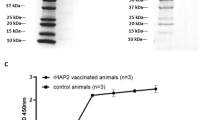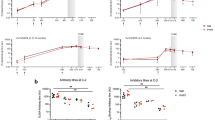Abstract
THE importance of immunological differences between strains in the epidemiology of human malaria is well known1. A disease comparable in some respects with malaria is bovine babesiosis. It is transmitted by a tick, and the protozoan parasites which cause the disease invade the red blood cell.
This is a preview of subscription content, access via your institution
Access options
Subscribe to this journal
Receive 51 print issues and online access
$199.00 per year
only $3.90 per issue
Buy this article
- Purchase on Springer Link
- Instant access to full article PDF
Prices may be subject to local taxes which are calculated during checkout
Similar content being viewed by others
References
Taliaferro, W. H., Fourth Int. Congr. trop. Med., Washington, D.C., 1, 776 (1948).
Callow, L. L., and Hoyte, H. M. D., Aust. vet. J., 37, 66 (1961).
Legg, J., Pamphl. Coun. sci. industr. Res. Aust., No. 56, 48 (1935).
Sergent, E., Donatien, A., Parrot, L., and Lestoquart, F., Studies on Bovine Piroplasmosis, 816 (Institut Pasteur d'Algérie, 1945).
Author information
Authors and Affiliations
Rights and permissions
About this article
Cite this article
CALLOW, L. Strain Immunity in Babesiosis. Nature 204, 1213–1214 (1964). https://doi.org/10.1038/2041213a0
Published:
Issue Date:
DOI: https://doi.org/10.1038/2041213a0
This article is cited by
-
Inhibitory Synaptic Regulation of Motoneurons: A New Target of Disease Mechanisms in Amyotrophic Lateral Sclerosis
Molecular Neurobiology (2012)
-
Use of random amplified polymorphic DNA analysis to compareBabesia bovis andB. bigemina isolates
Parasitology Research (1994)
-
Clinical and Serological Response after Experimental Inoculation with Babesia Divergens of Newborn Calves with and without Maternal Antibodies
Acta Veterinaria Scandinavica (1987)
-
Serological comparison of strains ofBabesia bovis occurring in Australia and Mozambique
Tropical Animal Health and Production (1981)
-
Bovine Babesiosis: Sterile immunity toBabesia bigemina andBabesia argentina infections
Tropical Animal Health and Production (1973)
Comments
By submitting a comment you agree to abide by our Terms and Community Guidelines. If you find something abusive or that does not comply with our terms or guidelines please flag it as inappropriate.



